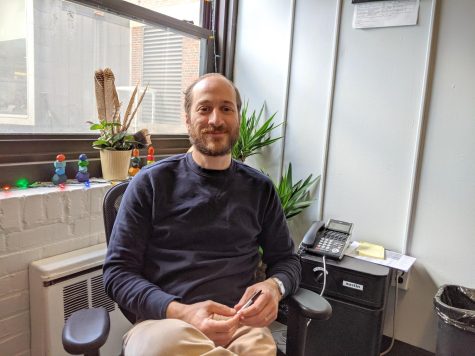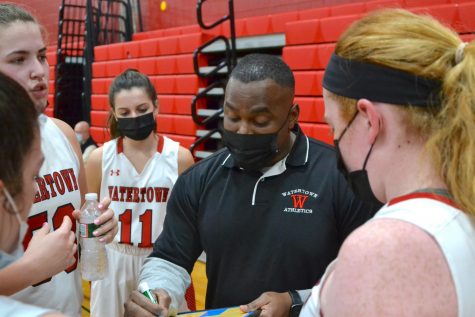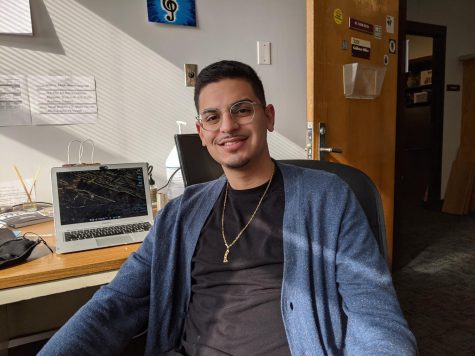Meeting the invisible society
One night working with CityReach program helps youth understand the life of Boston’s homeless
Imagine coming to America and being homeless. Imagine getting out of jail just to realize you have nowhere to go. Imagine losing your job and having no option but to sleep on the ground outside. Imagine not knowing whether you are eating tonight or not.
These situations are true for homeless people around the world. Homelessness is ubiquitous, yet invisible to society.
That’s what CityReach is trying to change.
This urban outreach program is run by Ecclesia Ministries, based in Boston. CityReach connects all kinds of people to work toward one common goal: eliminating the displaced population.
CityReach combines faith, community, and volunteer work to help homeless people in Boston. Most of the staff are currently homeless or have been homeless at some point. Some of them have been homeless for 20 years or more.
I came with initial uneasiness, but left with a whole new outlook
This January, I went to St. Paul’s Cathedral across from Boston Common for a youth retreat. Not knowing what to expect, I was nervous.
CityReach organizes these events with youth volunteers several times a year. This time there were four groups of high school-aged volunteers: one from North Andover, one from Wellesley, one from Shrewsbury, and one from Watertown. In total, around 90 youth participated. Our goal was to distribute clothes and food to homeless people in St. Paul’s Church and to learn about the life of the homeless. I came with initial uneasiness, but left with a whole new outlook on society and on people who don’t have homes.
First, we heard their stories.
The CityReach staff told us their plights and how they’ve recovered from them. Everyone who spoke lost their job, fell victim to drugs and addiction, or simply didn’t want to live with their parents and moved out only to realize that they couldn’t build a life alone.
Later that night, we got a tour of Boston from their perspective. Split into groups, we dispersed around the city. My group walked to South Station, where the rush of travelers and trains veil the homeless seeking warmth there. The tour changed my view of the sparkling city of Boston because I saw a dimmer and harsher reality in and outside of South Station where the homeless laid down to sleep. In the bitter cold, it was hard and poignant to imagine that thousands of people at that moment were sleeping outside.
That night, we slept in St. Paul’s on pews. Not having our own beds and stable homes to return to, we felt a fraction of what the homeless feel everyday in their itinerant lives.
The next morning, a 6 a.m. wake-up call signaled the long day ahead. After hours of preparation and set up, the church was ready to open its doors to the homeless who were looking for clothes and food. The volunteers dispersed to different stations in the building and helped over a hundred homeless people who came in throughout the day.
Amid the craziness and the bustle of the crowd and the loud voices and the confusion, I found connections with people. Some of the youth were uneasy about helping the homeless people or talking with them, but I found great comfort in knowing that everyone had a story and was willing to tell it.
One woman, Jane, arrived to the United States in 1984 to no house. She was born in London and met her husband online. They fell in love, and she immigrated here to marry him.
Some of the youth were uneasy about helping the homeless people or talking with them.
But this is not a calamitous love story about a couple that tragically lost their house and their stable lives: Jane knew that her soon-to-be husband was homeless before she came to this country. She willingly left her comfortable life and family in England to be homeless with him.
Her story is unique, and she is unlike most of the people who came to CityReach. Jane proves that every homeless person has their own path. They are individuals with different stories.
It was rewarding to make a difference and help them just by giving them one deli sandwich and a few snacks, or listening to what they had to say. Most of the people who came in were polite to varying degrees. Their personalities ranged: some kept their heads down and simply nodded to me, while others bounced up to the table with bright smiles and arms full of new clothes, looking for conversation.
One man told me that the sandwich I gave him was the best he had ever tasted.
Another man called me over to where he was sitting to refill his coffee cup four times. He later thanked me and smiled.
One woman told me, “Chase after any dream you have, and don’t be complacent, like I was.” I was surprised to hear someone be so upfront and didactic.
Another woman had pink hair and offered to dye mine as well, since I liked hers so much. I considered it, but then pictured my parents yelling at me for letting a homeless woman dye my hair neon pink, and decided against it.
CityReach does amazing work all across the country. By helping those in need and spreading knowledge about homelessness, the organization reaches all parts of society. Just because someone sleeps outside and has dirty clothes, they can still be nice. Anyone in the world can become homeless, but they’re still the same person they were when they had a place to live.
The next time you see a homeless person begging for change on the street, don’t tense up and be uncomfortable as I used to. Don’t let scary assumptions about homeless people dominate your mind.
It’s cliché but true: try to see the person behind the stereotypes and reach out to them. Even by giving them a dollar or asking how they are, you can make a difference in their life by acknowledging them and thinking of them.
Even though homeless people don’t have houses, and they may or may not have full-time jobs or families, most create a life for themselves. By finding a street corner, an overhang, a shopping cart, or a storefront to call their own, they create their own patterns. They still have lives, just ones much different than ours.
(For information on CityReach, go to its home on the web at http://www.ecclesia-ministries.org/cityreach.html.)
–Feb. 24, 2014–
Your donation will support the student journalists of Watertown High School. Your contribution will allow us to purchase equipment and cover our annual website hosting costs.







